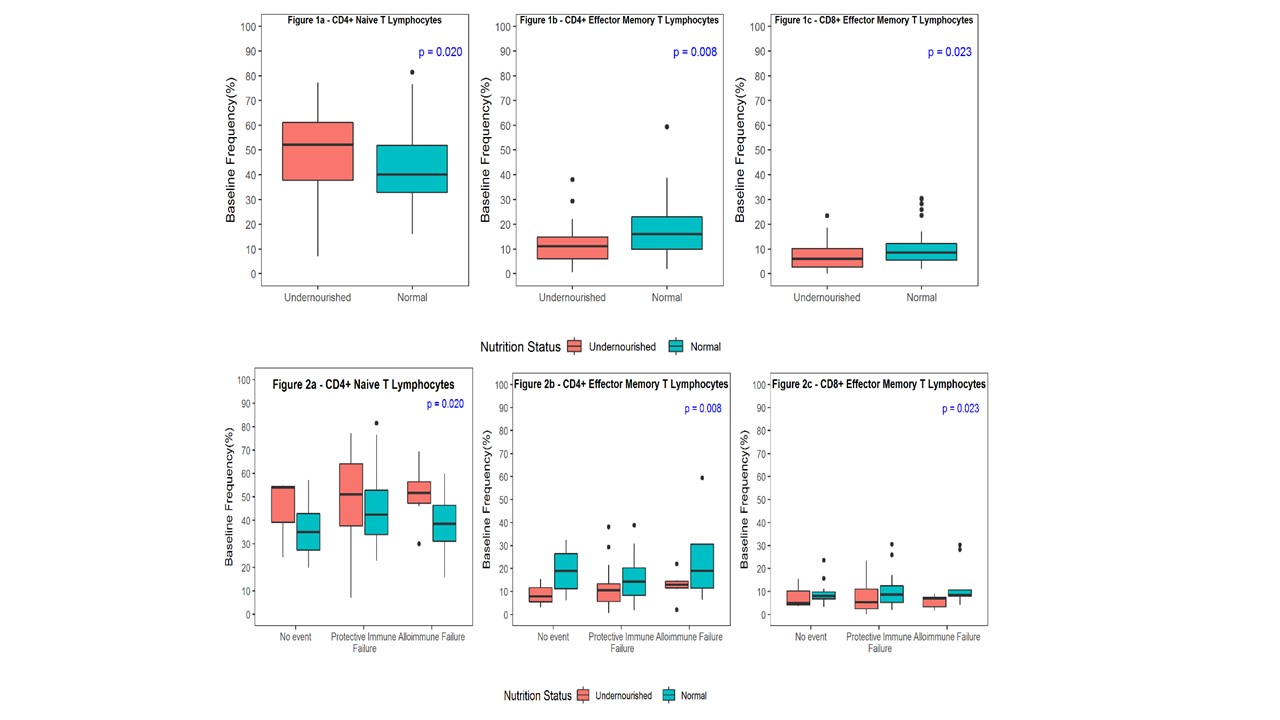Undernutrition is Associated with Impaired T Cell Protective Immunity in Pediatric Kidney Transplantation
1Pediatrics, Duke University, Durham, NC, 2Pediatrics, UCLA, Los Angeles, CA, 3Pediatrics, Stanford, Palo Alto, CA, 4Pediatrics, UCSF, San Francisco, CA, 5Surgery, Duke University, Durham, NC, 6Pediatrics, Emory University, Atlanta, GA, 7Surgery, Stanford, Palo Alto, CA
Meeting: 2019 American Transplant Congress
Abstract number: 133
Keywords: Infection, Monitoring, Weight
Session Information
Session Name: Concurrent Session: Kidney: Pediatrics I
Session Type: Concurrent Session
Date: Sunday, June 2, 2019
Session Time: 4:30pm-6:00pm
 Presentation Time: 4:54pm-5:06pm
Presentation Time: 4:54pm-5:06pm
Location: Room 304
*Purpose: Undernutrition has been associated with T cell immune cell dysfunction and infectious complications in non-immunosuppressed children. Thus, we aimed to define T cell phenotypes associated with undernutrition that may predispose children to viral events post-transplantation.
*Methods: 104 children (age 1-21) from the multi-center, NIH, Immune Development in Pediatric Transplantation (IMPACT) trial were prospectively monitored for 1 year after kidney transplantation. Undernutrition was defined as z-score less than 2 SD for weight, height, and body mass index. Patients were categorized as having no event, impaired protective immunity defined by PCR positive viremia/clinical viral infection, or alloimmune failure characterized by donor specific antibody development or biopsy proven acute rejection. Multiparameter flow cytometry was monitored for naïve CD45RA+CCR7+, central memory CD45RA-CCR7+, effector memory CD45RA-CCR7-, effector memory RA CD45RA+CCR7-, senescent (CD57+), and exhausted (PD1+) CD4/CD8 T cells.
*Results: Of 104 children, 98 had nutritional data available. Undernourished patients were disproportionately represented (36.4%) in the 64 patients with impaired protective immunity compared to the 15 patients with no event (18.8%) or the 19 patients with alloimmune failure (27.3%). Undernourished recipients had higher naïve CD4, lower effector memory CD4 and lower CD8 effector memory T cells (Fig 1a-c) pre-transplantation (baseline) compared to their nourished counterparts. This T cell phenotype persisted in undernourished patients across all 3 clinical outcome groups (Figure 2 a-c).
*Conclusions: Undernutrition is associated with posttransplant viremia and evidence of impaired peripheral T cell maturation. This should be taken into consideration when tailoring immunotherapy and optimizing nutrition.
To cite this abstract in AMA style:
Chambers ET, Chan C, Ettenger R, Grimm P, Reed E, Sarwal M, Stempora L, Warshaw B, Zhao C, Martinez O, Kirk A. Undernutrition is Associated with Impaired T Cell Protective Immunity in Pediatric Kidney Transplantation [abstract]. Am J Transplant. 2019; 19 (suppl 3). https://atcmeetingabstracts.com/abstract/undernutrition-is-associated-with-impaired-t-cell-protective-immunity-in-pediatric-kidney-transplantation/. Accessed March 3, 2026.« Back to 2019 American Transplant Congress

